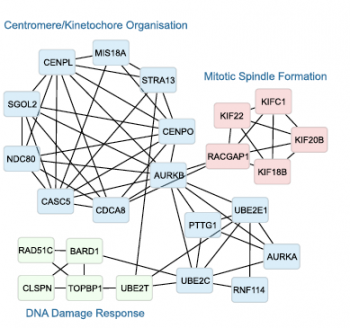12 Jan 2022 - Tumor suppressing mechanism of SUMO deconjugase SENP6 revealed
Defects in SUMOylation have long been suspected as potential drivers of carcinogenesis, however, positive proof has been lacking. The post-translational modification of proteins with the ubiquitin-like modifier SUMO is known to regulate numerous essential cellular functions, and aberrant SUMO patterns have frequently been found in cancers. Now, a team of researchers around IBC2 Vice Director Stefan Müller and Ulrich Keller from Charité has identified the missing mechanistic link: They identified a tumor suppressing function for SUMO deconjugase SENP6, one of the enzymes responsible for reversion of SUMO modifications. In one third of B-cell lymphoma patients, SENP6 was found mutated or deleted. Loss of SENP6 was then in a next step shown to directly affect DNA repair and genome maintenance by destabilizing protein complexes involved in both essential pathways, ultimately leading to genome instability.
The deep molecular insight gained also reveals exciting novel therapeutic options with already approved drugs. In preclinical models, SENP6-deficient tumors were found to be sensitive to PARP inhibitors which are a well-established component of breast cancer treatment. Further studies will now have to show if the promise holds true in the clinical setting, and if SENP6 loss can be established as important biomarker for therapeutic decisions.
The detailed mechanistic study was published in the latest issue of Nature Communications, besides colleagues from Goethe University Frankfurt and Charité in Berlin, the team also comprised scientists from the German Cancer Research Center, from Max-Delbrück-Center, TU Munich, from the Bavarian Health and Food Safety Authority, and from Universities of Saarland, Würzburg, Göttingen and Freiburg.
Schick M et al. Genetic alterations of the SUMO isopeptidase SENP6 drive lymphomagenesis and genetic instability in diffuse large B-cell lymphoma.
Nat Commun (2022), DOI: 10.1038/s41467-021-27704-8.
